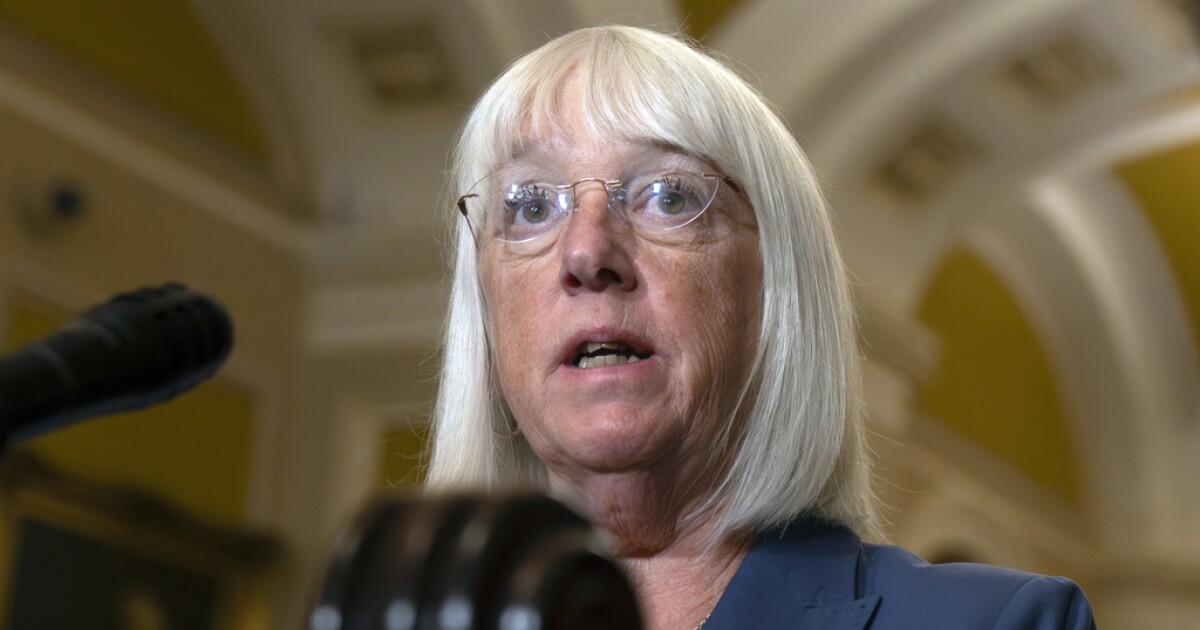

Sen. Patty Murray (D-WA), the chairwoman of the Appropriations Committee, moved to suspend Senate rules on Monday to overcome Sen. Ron Johnson’s (R-WI) objection to combining the three appropriations bills last week.
The Senate is expected to vote later this week on a measure to suspend Rule 16, which will require the unanimous consent of 67 senators in order to pass. An alternative vote will also be required to consider amendments to the minibus, which would combine three appropriations bills, transportation and housing, agriculture and military construction, and Veterans Affairs.
RETAILERS TURN TO FOG MACHINES TO CREATE ‘NEAR-ZERO VISIBILITY’ TO STOP THEFT
“We have been working very hard in a bipartisan effort, in good faith, to set up a robust process for amendments and debate,” Murray said during remarks on the Senate floor. “Unfortunately, a few senators decided to object to us last week, and now, Madam President, we are moving forward.”
“A lot of senators have come to me and to others and have spoken on the floor about how much they hate doing a gigantic omnibus at the end of the year, and we have been working really hard on this package to make sure we don’t get stuck doing that once again,” She added.
“If everyone is serious about wanting to show this place can work, well, now is the time to come together to make sure we can do that,” she continued.
Last week, Johnson demanded the Senate take up each appropriations bill one by one, which has held up the process, emphasizing that combining the bills could weaken the influence conservatives could have over the spending bills.
“I’m pushing for functionality to be returned to this chamber,” Johnson told the Washington Examiner last week. “What’s wrong with taking up just one bill? Pass it, move on to the next.”
While some Republican aides are signaling there will likely be enough GOP votes to bypass the 67-vote threshold to move forward with the raft of bills, GOP leadership isn’t ready to say that Republicans will work with Democrats to suspend the rules definitively.
“We’ll have a better sense of that tomorrow,” Sen. John Thune (R-SD) told reporters on Monday evening.
Sen. John Cornyn (R-TX), formerly the Senate majority whip, also said he was unsure if there are enough GOP votes to bypass the rules but said Senate Majority Leader Chuck Schumer (D-NY) is partially responsible for the dysfunction, only weeks ahead of a shutdown deadline.
“I place at least half of that blame to Sen. Schumer because we didn’t have to wait 80 days after the first appropriations bill was passed out of the Appropriations Committee on a bipartisan basis to start this. That seems very contrived,” Cornyn said.
Last week, by a vote of 85-12, the Senate took the first procedural hurdle in passing the legislation. The 12 senators who voted “no” were all Republicans. Ahead of the August recess, the Senate Appropriations Committee approved all 12 bills in line with the caps laid out in the debt ceiling deal negotiated by President Joe Biden and House Speaker Kevin McCarthy (R-CA). The agreement limits overall national security spending in fiscal 2024 to $886 billion, which is roughly a 3% increase from current levels. In fiscal 2025, defense spending would be capped at $895 billion, a 1% increase from the previous year.
Sen. Chuck Grassley (R-IA) made the case that lawmakers should vote to move forward with the legislation since individual senators can have influence during the amendment process.
“It’s going to be a big issue within our caucus because everybody wants regular order. This is getting back to regular order,” Grassley said, speaking to the Washington Examiner. “This is an issue for the people that are probably complaining about it. If they aren’t on the Appropriations Committee, they now have a chance to participate in the appropriations process by amendment by debate. You never get that when you have an omnibus appropriation bill.”
“I know that people want things. People say you ought to do one at a time instead of three at a time, but you can’t turn a battleship around overnight,” Grassley added.
Even if this vote moves forward, it does not address Congress’s most imminent problem, the looming government shutdown. Previously, lawmakers agreed they’d likely need a stopgap government funding bill to keep the government’s lights on past the Sept. 30 deadline.
The action in the Senate comes as the House is still working to pass a temporary spending bill after negotiations between the House Freedom Caucus and the Republican Main Street Caucus over the weekend.
Schumer made it clear the bill, if passed by the House, still has virtually no chance of passing in the upper chamber.
CLICK HERE TO READ MORE FROM THE WASHINGTON EXAMINER
“Last night, House GOP members released what they called a deal for a CR, but in reality, it reads like a hard-right screed,” Schumer said on the floor of the Senate on Monday afternoon.
“Last night’s proposals can be boiled down to two words: slapdash and reckless. Slapdash because it’s not a serious proposal for avoiding a shutdown and reckless because, if passed, it would cause immense harm to so many priorities that help the American people,” he added.






